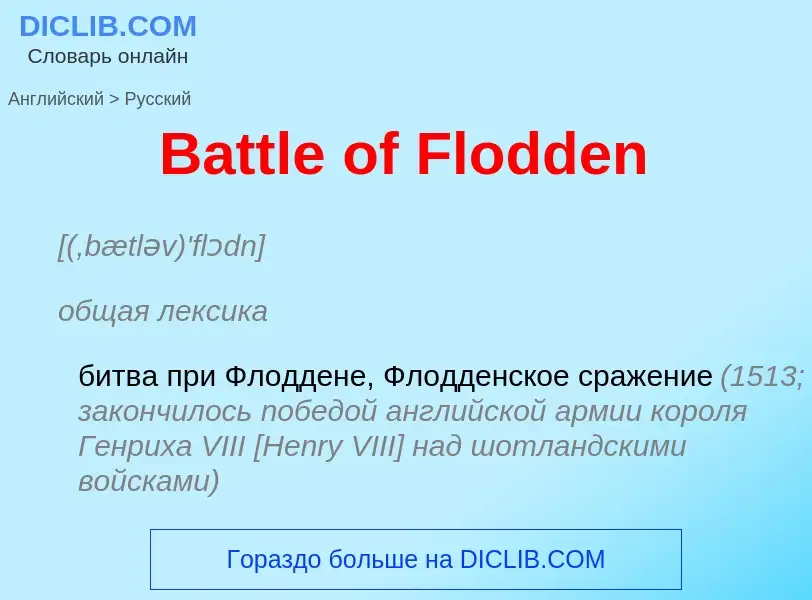Перевод и анализ слов искусственным интеллектом ChatGPT
На этой странице Вы можете получить подробный анализ слова или словосочетания, произведенный с помощью лучшей на сегодняшний день технологии искусственного интеллекта:
- как употребляется слово
- частота употребления
- используется оно чаще в устной или письменной речи
- варианты перевода слова
- примеры употребления (несколько фраз с переводом)
- этимология
Battle of Flodden - перевод на русский
[(,bætləv)'flɔdn]
общая лексика
битва при Флоддене, Флодденское сражение (1513; закончилось победой английской армии короля Генриха VIII [Henry VIII] над шотландскими войсками)
по названию возвышенности на севере Англии, где произошло сражение
['flɔdn,fi:ld]
синоним
[(,bætləv)'kresɪ]
общая лексика
битва при Креси (1346; крупная победа английских войск короля Эдуарда III [Edward III] над французской армией во время Столетней войны [Hundred Years' War])
по названию французского населённого пункта, в районе кот. происходила битва
Определение
.
Википедия

The Battle of Flodden, Flodden Field, or occasionally Branxton, (Brainston Moor) was a battle fought on 9 September 1513 during the War of the League of Cambrai between the Kingdom of England and the Kingdom of Scotland, resulting in an English victory. The battle was fought near Branxton in the county of Northumberland in northern England, between an invading Scots army under King James IV and an English army commanded by the Earl of Surrey. In terms of troop numbers, it was the largest battle fought between the two kingdoms.
After besieging and capturing several English border castles, James encamped his invading army on a commanding hilltop position at Flodden and awaited the English force which had been sent against him, declining a challenge to fight in an open field. Surrey's army, therefore, carried out a circuitous march to position themselves in the rear of the Scottish camp. The Scots countered this by abandoning their camp and occupying the adjacent Branxton Hill, denying it to the English. The battle began with an artillery duel followed by a downhill advance by Scottish infantry armed with pikes. Unknown to the Scots, an area of marshy land lay in their path, which had the effect of breaking up their formations. This gave the English troops the chance to bring about a close-quarter battle, for which they were better equipped. James IV was killed in the fighting, becoming the last monarch from Great Britain to die in battle; this and the loss of a large proportion of the nobility led to a political crisis in Scotland. British historians sometimes use the Battle of Flodden to mark the end of the Middle Ages in the British Isles; another candidate is the Battle of Bosworth Field in 1485.



![halbedier]]s; the fighting at Flodden must have had a similar appearance. halbedier]]s; the fighting at Flodden must have had a similar appearance.](https://commons.wikimedia.org/wiki/Special:FilePath/Battle Scene, by Hans Holbein the Younger.jpg?width=200)

![bill]], reputed to have been used at Flodden. bill]], reputed to have been used at Flodden.](https://commons.wikimedia.org/wiki/Special:FilePath/English Bill.jpg?width=200)
 - 2004-Feb-06 - Looking SSE from the monument.jpg?width=200)

![The Flodden memorial cross, erected in 1910, contemplated by the Tudor historian [[David Starkey]]. The Flodden memorial cross, erected in 1910, contemplated by the Tudor historian [[David Starkey]].](https://commons.wikimedia.org/wiki/Special:FilePath/Flodden memorial.jpg?width=200)
![James IV captured [[Ford Castle]] from Lady Heron James IV captured [[Ford Castle]] from Lady Heron](https://commons.wikimedia.org/wiki/Special:FilePath/Ford Castle - geograph.org.uk - 1899644.jpg?width=200)

![[[Norham Castle]], which fell to the Scots on 29 August after a six-day bombardment by James's artillery. [[Norham Castle]], which fell to the Scots on 29 August after a six-day bombardment by James's artillery.](https://commons.wikimedia.org/wiki/Special:FilePath/Norham Castle.jpg?width=200)
![An 1873 [[artist's impression]] of the hand-to-hand fighting at the height of the battle. An 1873 [[artist's impression]] of the hand-to-hand fighting at the height of the battle.](https://commons.wikimedia.org/wiki/Special:FilePath/The Battle of Flodden.jpg?width=200)
![Twizell (or Twizel) Bridge]], which allowed the English artillery to cross the River Till and outflank the Scottish Army. Twizell (or Twizel) Bridge]], which allowed the English artillery to cross the River Till and outflank the Scottish Army.](https://commons.wikimedia.org/wiki/Special:FilePath/Twizel Bridge - geograph.org.uk - 78955.jpg?width=200)



, f.152v - BL Cotton MS Nero E II.jpg?width=200)
![A modern replica of a [[bodkin point]] arrowhead used by [[English longbows]] to penetrate armour}} A modern replica of a [[bodkin point]] arrowhead used by [[English longbows]] to penetrate armour}}](https://commons.wikimedia.org/wiki/Special:FilePath/Bodkin1.jpg?width=200)
.jpg?width=200)
![[[Edward III]] counting the dead on the battlefield of Crécy}} [[Edward III]] counting the dead on the battlefield of Crécy}}](https://commons.wikimedia.org/wiki/Special:FilePath/Edward III counting the dead on the battlefield of Crécy.jpg?width=200)
![bombard]] as used at the Battle of Crécy}} bombard]] as used at the Battle of Crécy}}](https://commons.wikimedia.org/wiki/Special:FilePath/English gun used at Crecy.jpg?width=200)


.jpg?width=200)

